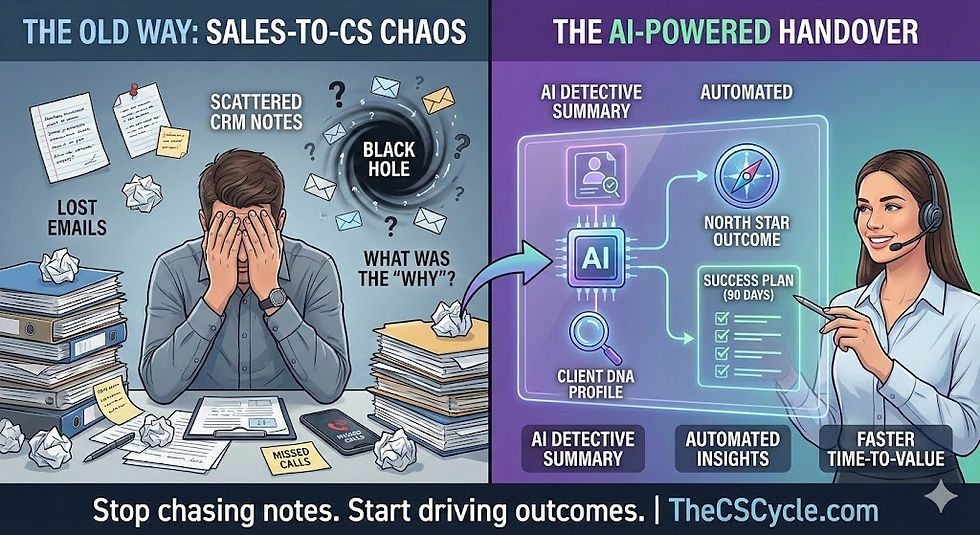Future-Proofing Customer Success: 5 Habits That Compound Your Impact
- Guy Galon
- May 3, 2025
- 3 min read
In Customer Success, much of the conversation today revolves around data, tools, and outcomes. But behind every great outcome is something less glamorous but far more powerful: consistent, intentional habits.
With AI reshaping the CS landscape, and expectations rising for revenue alignment and strategic impact, many CSMs are asking: "How do I keep up—and get ahead?"
-> The answer isn’t just in learning new tools. It’s in building a system of daily behaviors that sharpen your instincts, expand your influence, and earn long-term trust.
Here are five compounding habits that can quietly transform how you work—and how you're perceived—in the years ahead.
1. Build Proactive Systems, Not Just Intentions
Habit: Block weekly time for proactive outreach.
System: Use segmentation to guide where you focus. Identify 2–3 touchpoints each week for strategic customers, and scale outreach through automation where appropriate.
Why it works: Being proactive isn’t about heroic effort but consistent systems. Customers want a guide who brings value before the pain hits. Proactivity builds trust and reduces the volume of reactive escalations.
Try this: Use Fridays to reflect on your week and tee up next week’s proactive actions. What new usage data, product insights, or trends can you share?
2. Make Reflection a Ritual
Habit: Post-interaction learning.
System: After key meetings or calls, jot down three bullet points: what worked, what didn’t, and what’s next. Using AI to summarize the transcript is your first step —but don’t outsource your thinking to someone else. This is how you differentiate yourself.
Why it works: Reflection sharpens performance. Over time, you’ll spot patterns, build playbooks, and coach others more effectively. It turns every customer conversation into a new learning moment.
Personal tip: I started doing this after high-stakes service reviews. What felt like an extra task became a wellspring of insights—and a source of strategic ideas that my team and I could act on.
3. Expand Beyond Product Expertise
Habit: Stay informed on industry news daily.
System: Subscribe to relevant newsletters, follow thought leaders, and track your customers’ ecosystem. One insight a day is enough to stay sharp.
Why it works: Customers expect product knowledge. What they value is your ability to contextualize that product within their business environment. That’s how you become a strategic advisor.
Example: In a previous role, citing a vendor acquisition from a tech newsletter helped a customer plan their roadmap. It didn’t drive immediate results, but it got me into the room with senior stakeholders, with whom I could develop more meaningful relationships.
4. Build Bridges Before You Need Them
Habit: Schedule weekly informal chats.
System: Connect with internal peers (sales, marketing, product) or external CS professionals. Keep it casual—15 to 30 minutes is enough.
Why it works: Influence is relational. Strong internal ties break down silos. A healthy external network gives you perspective, ideas, and introduces future opportunities.
What I’ve seen: Informal chats, by being close to the action, led to early alignment on messaging, smoother cross-team work, and even a few career achievements, resulting from strong bridges and solid collaboration.
5. Embrace Improvisation as a Skill
Habit: Try one unscripted response or decision per week.
System: When the playbook isn’t enough, lean on your instincts. Note how it went—and what you’d do differently next time.
Why it works: No tool or template can prepare you for every moment. From tough objections to exec presentations, improvisation builds confidence and resilience.
Sample cases to train your improvisation skills: Navigating tricky QBR conversations, shifting gears during commercial discussion, or making a judgment call during an urgent escalation. Practice makes presence.
Small Steps, Lasting Impact
These habits don’t require a major transformation—just intention, consistency, and reflection. Over time, they build credibility, sharpen thinking, and increase value.
So, as you prepare for the future of Customer Success, focus less on chasing the next big objective and more on mastering the small things that quietly shape your professional reputation.
One habit at a time.




Comments